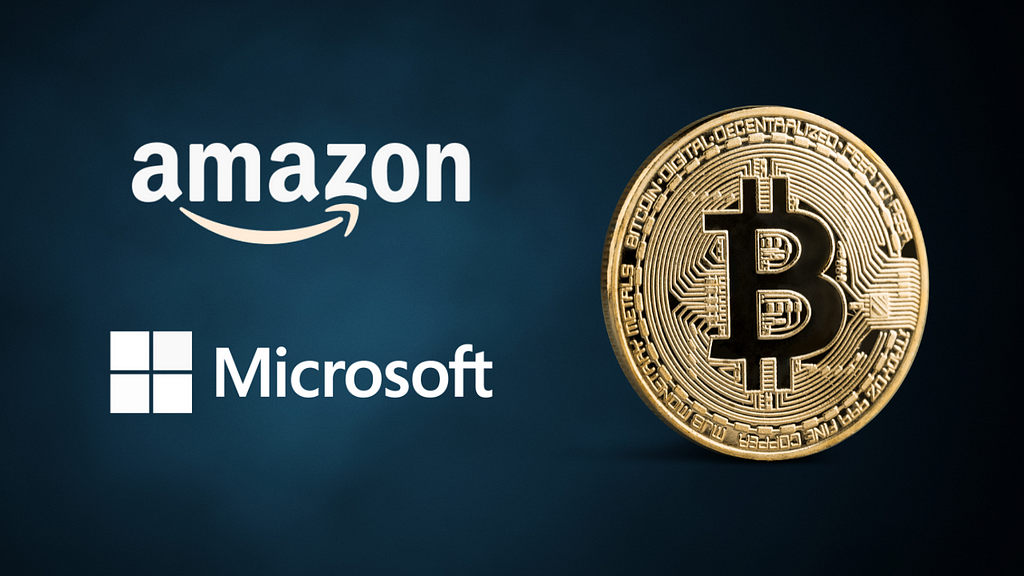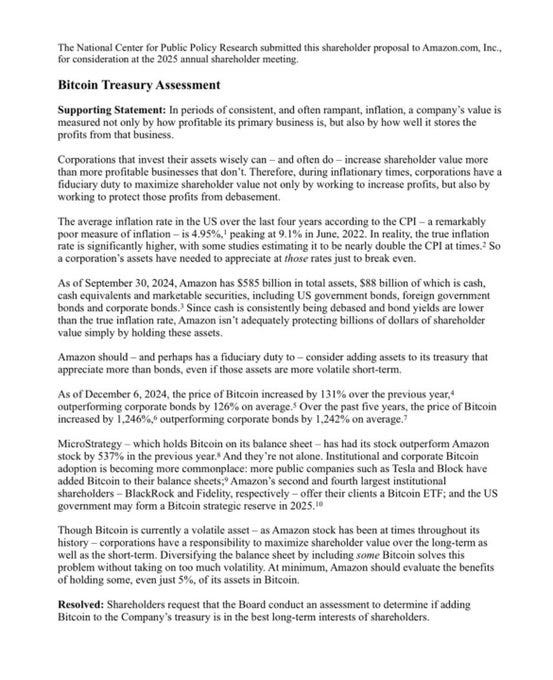Shareholders of Amazon, led by the National Center for Public Policy Research, have submitted a proposal urging the company to assess the merits of holding Bitcoin in its treasury. This groundbreaking suggestion aligns with a broader shift in corporate attitudes toward cryptocurrency and highlights Bitcoin’s growing significance as a strategic financial asset. Here’s a detailed look at the proposal, its implications, and what it means — even if Amazon ultimately decides not to adopt Bitcoin.
Summary of the Proposal: Bitcoin Treasury Assessment
The proposal outlines the following key points:
1. Inflation Concerns:
• Over the past four years, inflation in the U.S. has averaged 4.95%, peaking at 9.1% in June 2022. This devalues cash and bonds, which are Amazon’s primary treasury holdings.
• With $88 billion in cash, cash equivalents, and marketable securities as of September 30, 2024, Amazon’s reserves are vulnerable to inflation-driven erosion.
2. Fiduciary Responsibility:
• Corporations have a duty to maximize shareholder value by protecting reserves from debasement.
• Bitcoin offers a hedge against inflation due to its finite supply and decentralized nature.
3. Bitcoin’s Performance:
• Bitcoin outperformed traditional assets in the past year, rising 131%, compared to corporate bonds’ 126% growth.
• Over five years, Bitcoin has increased by 1,246%, making it one of the best-performing assets.
4. Industry Examples:
• Companies like MicroStrategy, Tesla, and Block (formerly Square) have integrated Bitcoin into their treasuries. MicroStrategy’s stock price surged after its Bitcoin adoption, reinforcing the cryptocurrency’s potential as a high-growth asset.
5. Volatility Concerns:
• While Bitcoin is volatile, the proposal argues that this risk is comparable to Amazon stock’s historical fluctuations. The potential long-term benefits outweigh the short-term risks.
Resolution: Shareholders ask Amazon’s board to conduct an assessment to determine whether adding Bitcoin to its treasury aligns with the long-term interests of shareholders.
The Michael Saylor Connection: Bitcoin Advocacy at Microsoft
This isn’t the first time Bitcoin has entered boardroom discussions at tech giants. Michael Saylor, Executive Chairman of MicroStrategy, presented a similar case to Microsoft, emphasizing:
• Bitcoin as Digital Gold: With properties superior to traditional gold, Bitcoin offers a secure, portable, and inflation-resistant store of value.
• Inflation Hedge: Saylor highlighted the risks of holding cash reserves amid rising inflation.
• Corporate Image: Companies that adopt Bitcoin signal forward-thinking innovation, attracting younger, tech-savvy audiences.
Though Microsoft has yet to act, Saylor’s advocacy mirrors the themes in the Amazon proposal: a growing recognition of Bitcoin’s potential in corporate finance.
What This Means — Even Without Adoption
Even if Amazon decides not to add Bitcoin to its treasury, the proposal itself is significant:
1. Legitimizing Bitcoin:
• The proposal reflects Bitcoin’s evolution from a speculative asset to a serious consideration for treasury management.
2. Corporate Awareness:
• Large corporations like Amazon and Microsoft evaluating Bitcoin signals to the broader market that cryptocurrency is entering mainstream finance.
3. Driving Innovation:
• Exploring Bitcoin could inspire Amazon to innovate further, such as integrating blockchain for payment systems or supply chain management.
4. Encouraging Other Companies:
- Amazon’s exploration might motivate other companies to reassess their treasury strategies, contributing to the broader adoption of Bitcoin.
Risks and Rewards for Amazon
Potential Benefits:
• Inflation Protection: Safeguards reserves against currency devaluation.
• Shareholder Value: Aligns with fiduciary duties to maximize returns.
• Market Leadership: Positions Amazon as a financial innovator.
Potential Risks:
• Volatility: Bitcoin’s price swings could introduce short-term instability.
- Regulatory Uncertainty: Government policies around cryptocurrency remain unclear.
The proposal to Amazon — and Michael Saylor’s presentation to Microsoft — signals a paradigm shift in how Bitcoin is viewed in corporate finance. Whether or not Amazon adopts Bitcoin, the discussion highlights its growing role as a hedge against inflation and a strategic asset for forward-thinking companies. This development is more than just a conversation about Bitcoin; it’s about innovation, risk management, and redefining the way corporations approach financial sustainability.
💡 What’s your take? Should Amazon add Bitcoin to its balance sheet, or is it too soon? Let’s discuss!
Follow me on X for more Bitcoin related news. https://x.com/jmoroles1981

Why Amazon Shareholders Want Bitcoin in the Treasury: A Breakdown was originally published in The Capital on Medium, where people are continuing the conversation by highlighting and responding to this story.
